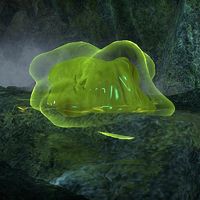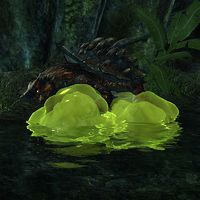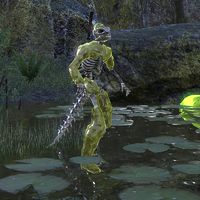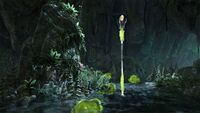Lore:Voriplasm
| Voriplasms | |||
|---|---|---|---|
 A Voriplasm A Voriplasm
|
|||
| Type | Beast | ||
| Range | Black Marsh, Northern Elsweyr (invasive) Apocrypha (invasive) |
||
| Appears in | |||
A Voriplasm (a.k.a. an Ooze or Slime)[1][2] is an amorphous blob of sentient green mucus,[3][4] mostly found in Black Marsh. Known for having an insatiable hunger, these creatures can strip down their victims to the bone within moments,[5] or can form spikes to pierce their target.[4] Voriplasms can then envelop and puppeteer the remaining skeletal structure of their victims as a "voriplasmic corpse".[6] The word for their name in Jel is unknown, but it translates to "death-mud".[7]
It is believed that their ability to split into smaller entities is how these slimes reproduce. One Argonian theorizes that perhaps all voriplasms originate from one singular "mother-beast".[4] Leading credence to this theory is the "Wuju-Ka", a gargantuan slime that was sealed away in Tsofeer Caverns in Murkmire. This Wuju-Ka was essentially a spawning pool, churning out smaller versions of itself, and had a higher degree of control over them than the common voriplasm. Indeed, it utilized them as its "eyes, ears, and appendages", and through these extensions is how it interacted with the world outside its containment.[8][9]
Voriplasms are considered highly metamorphic and are able to adapt to their surroundings with unbelievable specificity.[10] Voriplasms, or at least organisms very similar to them, seem to be capable of forming from unclean locations or diseased creatures, even outside of Black Marsh.[11]
Uses[edit]
Argonian weaponry is sometimes infused with voriplasm essence.[12] Alchemists are known to have interest in studying the creatures, even to the commitment of importing them from Black Marsh.[3] A mage from Lilmoth found a way to tentatively "tame" small voriplasms. While these pets follow their owners around, they are not particularly docile, and will attempt to engulf their owners if the opportunity arises.[2] The Daedric Prince Peryite uses voriplasms as a method for spreading disease.[13] Certain Daedra are known to take forms resembling voriplasms.[14]
Gallery[edit]
Voriplasms feeding on a dead Haj Mota
See Also[edit]
- For game-specific information, see the Elder Scrolls Online article.
Books[edit]
- Dradeiva's Journal by Dradeiva — Notes on the infamous disappearance of the Ninth Legion
- Noordigloop the Clog — Notes on a rogue Voriplasm
- On Voriplasms by Concordia Mercius of Cyrodilic Collections — A dissertation on the oozes of the swamp
References[edit]
- ^ Target Voriplasm description in ESO
- ^ a b Voriplasm pet description in ESO
- ^ a b Noordigloop the Clog
- ^ a b c The Elder Scrolls: The Official Survival Guide to Tamriel — Tori Schafer
- ^ The Argonian Account, Book 4 — Waughin Jarth
- ^ On Voriplasms — Concordia Mercius of Cyrodilic Collections
- ^ Lady Clarisse Laurent's dialogue in ESO
- ^ Dradeiva's dialogue in ESO
- ^ Dradeiva's Journal — Dradeiva
- ^ Vineyard Voriplasm pet description in ESO
- ^ Bile Globs, Peryite's Glory, and Spattering Ooze in ESO
- ^ Voriplasm Style in ESO
- ^ Plague Voriplasms in ESO
- ^ G'uub in ESO





